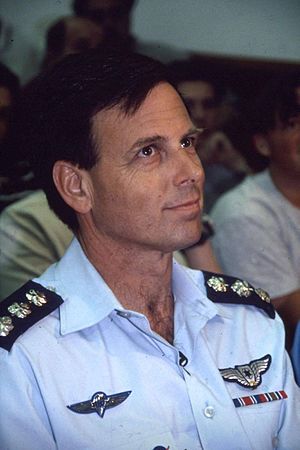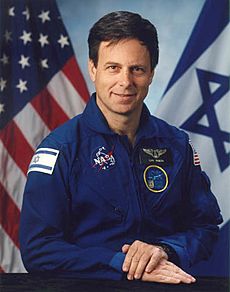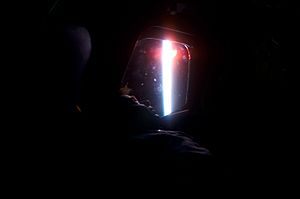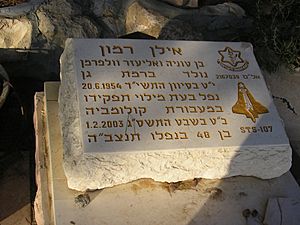Ilan Ramon facts for kids
Quick facts for kids
Ilan Ramon
|
|
|---|---|

Ilan Ramon, November 2001
|
|
| Born |
Ilan Wolfferman
June 20, 1954 Ramat Gan, Israel
|
| Died | February 1, 2003 (aged 48) |
| Alma mater | Tel Aviv University (BS) |
| Awards |
|
| Space career | |
| ISA astronaut | |
|
Previous occupation
|
Fighter pilot |
| Rank | Colonel, Israeli Air Force |
|
Time in space
|
15d 22h 20m |
| Selection | 1996 NASA Group |
| Missions | STS-107 |
|
Mission insignia
|
|
Ilan Ramon (born Ilan Wolfferman; June 20, 1954 – February 1, 2003) was an Israeli fighter pilot. He became the first Israeli astronaut. Ramon was a special crew member, called a payload specialist, on the Space Shuttle mission STS-107. This was the final flight of the Space Shuttle Columbia. Sadly, he and the six other crew members died when the spacecraft broke apart as it returned to Earth. Ilan Ramon was 48 years old, making him the oldest member of the crew. He is the only non-American person to receive the United States Congressional Space Medal of Honor, which was given to him after his death.
Contents
Ilan Ramon's Life Story
Ilan Ramon was born in Ramat Gan, Israel. His parents, Tonya and Eliezer Wolfferman, were from Ashkenazi Jewish families. He grew up in Beersheba. His father's family came from Germany in 1935 to escape the Nazis. His mother and grandmother were from Poland and survived the Holocaust. They moved to Israel in 1949.
Ilan's first name means "tree" in Hebrew. When he joined the Israeli Air Force (IAF), he changed his last name from Wolfferman to Ramon. This was a common practice for pilots and senior officers in the Israeli military to choose a more "Israeli" name.
He finished high school in 1972. Later, in 1987, he earned a degree in electronics and computer engineering from Tel Aviv University.
Air Force Career
Ilan Ramon became a Colonel and a skilled fighter pilot in the Israeli Air Force. He had thousands of hours of flying experience. He started pilot training in 1972 but had to pause after breaking his hand. During the Yom Kippur War, he served in an electronic warfare unit. After that, he returned to flight school and graduated in 1974.
From 1974 to 1976, he flew A-4 Skyhawk planes. From 1976 to 1980, he flew Mirage IIIC planes. In 1980, he was part of the first F-16 Squadron in Israel. He trained for the F-16 at Hill Air Force Base in Utah. From 1981 to 1983, he was a Deputy Squadron Commander for an F-16 Squadron.
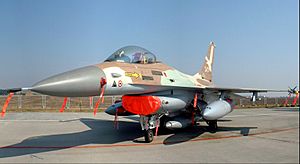
In 1981, he was the youngest pilot to take part in Operation Opera. This was an Israeli attack on Iraq's unfinished Osiraq nuclear reactor, which was destroyed. He also participated in the 1982 Lebanon War.
After attending Tel Aviv University, he served as Deputy Squadron Commander for the 119 Squadron, flying the F-4 Phantom (1988–1990). From 1990 to 1992, he commanded the 117 Squadron, flying the F-16. From 1992 to 1994, he led the Aircraft Branch in the Operations Requirement Department. In 1994, he was promoted to colonel. He then became head of the Department of Operational Requirement for Weapon Development and Acquisition until 1998.
Ramon flew over 3,000 hours on A-4, Mirage IIIC, and F-4 planes. He also flew over 1,000 hours on the F-16.
NASA Experience
NASA Training
In 1997, Ramon was chosen as a Payload Specialist. This meant he would be a special crew member for a space shuttle mission. His job included using a special camera to record desert dust from space. In July 1998, he began training at the Johnson Space Center in Houston, Texas. He trained there until 2003. He flew on STS-107, spending 15 days, 22 hours, and 20 minutes in space.
Space Flight: STS-107, Space Shuttle Columbia
The STS-107 Columbia mission lasted 16 days, from January 16 to February 1, 2003. It was a mission focused on science and research. The crew worked 24 hours a day in two shifts. They successfully completed about 80 experiments.
Even though he was not very religious in his daily life, Ramon followed some Jewish traditions in space. He said, "I feel I am representing all Jews and all Israelis." He was the first person in space to ask for kosher food. He also observed the Sabbath (a day of rest).
The STS-107 mission ended suddenly. The Space Shuttle Columbia broke apart as it returned to Earth. All crew members died 16 minutes before they were supposed to land.
Ramon's mother and grandmother were survivors of Auschwitz. S. Isaac Mekel, from the American Society for Yad Vashem, asked Ramon to take something from Yad Vashem into space. Yad Vashem is a memorial to the Holocaust. Ramon carried a pencil sketch called Moon Landscape. It was drawn by a 16-year-old boy named Petr Ginz, who was killed in Auschwitz.
Ramon also took a tiny copy of the Torah (a holy Jewish text) given to him by Israeli president Moshe Katsav. He also had a miniature Torah scroll from the Holocaust, given by a survivor of the Bergen Belsen camp. Ramon asked a Holocaust survivor group in Los Angeles for a symbol of the Holocaust to take into space. They chose a barbed wire mezuzah (a small scroll with religious texts) made by artist Aimee Golant. Ramon also carried a dollar bill given to him by the Lubavitcher Rebbe, Rabbi Menachem M. Schneerson.
Ramon and the rest of the Columbia crew died over East Texas in the Southern United States. This happened during their return to Earth's atmosphere.
On November 10, 2013, a special event was held by the American Society for Yad Vashem. Petr Ginz's nephew and Ramon's son, Tal, attended. Tal sang a song he wrote to remember his father.
Ilan Ramon's Diary
When the Columbia Space Shuttle crashed, about 40% of its contents were found. Among these items were 37 pages of Ramon's diary. NASA returned the diary to his wife, Rona. She shared a part of it with the public at the Israel Museum in Jerusalem.
Rona Ramon took the diary to forensic experts at the Israel Museum. Only two pages were shown. One had Ramon's notes, and the other was a copy of the Kiddush prayer. A Curator named Yigal Zalmona said the diary was partly fixed in one year. It would need four more years for police scientists to read 80% of the text. Zalmona said the diary survived extreme heat from the explosion and extreme cold in space. Then, it was "attacked by microorganisms and insects." He called its survival "almost a miracle" and "incredible." He said there was "no rational explanation" for how it was found when most of the shuttle was not.
The diary was written in black ink and pencil. It covered the first six days of the 16-day mission.
Family Life
Ilan Ramon was survived by his wife, Rona, and their four children: Assaf, Tal, Yiftah, and Noa. They were in Florida when the accident happened.
Assaf Ramon
Ramon's oldest son, Assaf (born February 10, 1988), died at age 21 on September 13, 2009. He was flying his F-16A during a training flight. This happened three months after he graduated from the IAF flight school as the best cadet. He lost consciousness because of the high speed and G-force. This caused his plane to crash, and he died. Assaf was known as an excellent pilot. He was a lieutenant in the Israeli Air Force and was promoted to captain after his death.
Rona Ramon
Ramon's wife, Rona Ramon, served in the Israel Defense Forces as a paramedic. She later earned a degree from the Wingate Institute. After Assaf's death, Rona went back to school. She earned a master's degree in holistic health. She also started giving talks about dealing with sadness and finding ways to cope. She was the first CEO of the Ramon Foundation. This non-profit organization helps young people achieve academic excellence and leadership through science and technology. Rona died on December 17, 2018, after fighting pancreatic cancer. After her death, she was given the Israel Prize for her lifetime achievements.
Awards and Honors
Ilan Ramon received several awards and honors:
- Military decorations:
- Yom Kippur War campaign ribbon (1973)
- 1982 Lebanon War campaign ribbon (1982)
- F-16 1,000 Flight Hours (1992)
- Awards given after his death:
- IDF Chief of Staff Medal of Appreciation
- Congressional Space Medal of Honor (He is the only non-U.S. citizen to receive this award)
- NASA Space Flight Medal
Places Named After Ilan Ramon
In Israel
- Ramon Airport, named for both Ilan and Assaf Ramon
- The international Ilan Ramon Conference, hosted by the Israel Space Agency
- Ilan Ramon Youth Physics Center, Ben-Gurion University of the Negev, Beersheba
- Ramon Control Tower, Ben-Gurion Airport
- Ilan Ramon Elementary School, Be'er Ya'akov
- Ilan Ramon Elementary School, Jerusalem
- Ilan Ramon Junior High School, Kfar Saba
- Ilan Ramon Elementary School, Netanya
- Ramon Elementary School, Modi'in
- Ramon High School, Hod Hasharon
- Ilan Ramon Junior High, Kokhav Ya'ir
- Ilan Ramon Emergency Center, Kaplan Hospital, Rehovot
- Ramon Park, Givat Shmuel
- Ilan Ramon Park, a space-themed playground, Beersheba
In Canada
- Ilan Ramon Boulevard, Vaughan, Ontario, Canada
- Ilan Ramon Crescent, Côte-Saint-Luc (Montreal), Quebec, Canada
In the United States
- Ramon Hall, in the Columbia Village apartments, Florida Institute of Technology
- Ilan Ramon AZA #380, Boulder, Colorado
- Ilan Ramon BBYO #5378, Oviedo, Florida
- Ramon AZA #195 (named after Ilan and Assaf Ramon), Sunnyvale, California
- Ilan Ramon Day School, Agoura, California
In Space
- Asteroid 51828 Ilanramon
- Ramon Hill, Columbia Hills on Mars
- Ramon Crater, inside the Apollo basin, on the far side of the Moon
See also
 In Spanish: Ilan Ramon para niños
In Spanish: Ilan Ramon para niños
- Space Shuttle Columbia disaster
- Columbia: The Tragic Loss, a documentary about the Space Shuttle Columbia accident
 | Delilah Pierce |
 | Gordon Parks |
 | Augusta Savage |
 | Charles Ethan Porter |


